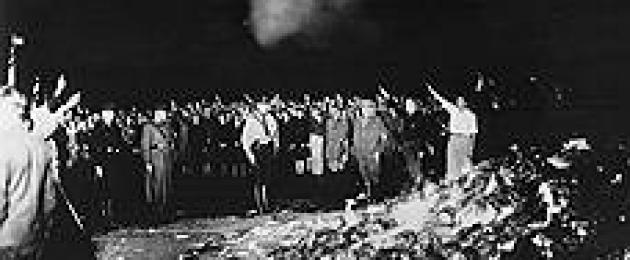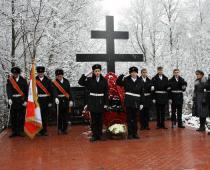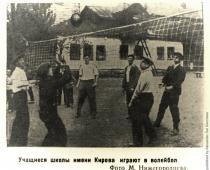" src="https://im8.kommersant.ru/Issues.photo/CORP/2014/10/28/KMO_142333_00095_1_t222_110344.jpg" class="lowsrc lowsrc-deferred">
Paul Joseph Goebbels (as an adult, he mostly used his middle name) was born October 29, 1897 in Reidt in a poor Catholic family of the accountant Friedrich Goebbels and grew up with four brothers and sisters. In early childhood, Joseph Goebbels suffered osteomyelitis, due to which his right leg was deformed - he wore special shoes for the rest of his life, but still could not get rid of the lameness
" src="https://im0.kommersant.ru/Issues.photo/CORP/2014/10/28/KMO_096855_06735_1_t222_110634.jpg" class="lowsrc lowsrc-deferred">
In 1914, at the beginning of the First World War, Joseph Goebbels wanted to volunteer for the front, but because of his lameness he was declared unfit for service. After graduating from the gymnasium in Reidt, Goebbels studied at the universities of Freiburg, Bonn, Würzburg, Cologne, Munich and Heidelberg from 1917 to 1921 - where he studied German studies, philology and history. In 1921, at the University of Heidelberg, Joseph Goebbels defended a "satisfactory" doctoral thesis on "Wilhelm von Schütz as a playwright. On the question of the history of the drama of the romantic school "and since then called himself none other than Dr. Goebbels
" src="https://im1.kommersant.ru/Issues.photo/CORP/2014/10/28/KMO_096855_06736_2_t222_185543.jpg" class="lowsrc lowsrc-deferred">
The future Minister of Propaganda of Nazi Germany dreamed of becoming a successful writer and in 1919 began writing the novel Michael. German Fate in Diary Leaflets” (which was finally completed by 1923 and published in a revised form in 1929). A sentimental and frankly anti-Semitic novel with elements of autobiography was severely criticized, and the career of a journalist and playwright did not work out, after which Joseph Goebbels became disillusioned with literature and decided to go into politics
" src="https://im6.kommersant.ru/Issues.photo/CORP/2014/10/28/KMO_096855_06734_1_t222_110720.jpg" class="lowsrc lowsrc-deferred">
On December 19, 1931, Joseph Goebbels married Magda Quandt (nee Berend); Adolf Hitler was the witness at their wedding. Quandt was a prominent member of the National Socialist German Workers' Party (NSDAP) and a close associate of Adolf Hitler. Magda Quandt met Goebbels a year earlier in Berlin, at one of the congresses of the NSDAP - she was impressed by the speeches of the young party activist. In this marriage, six children were born. In addition, it is known that after the outbreak of World War II, Quandt, on her own initiative, worked in her husband's ministry, supported the troops and consoled the widows of soldiers who died in the war.
" src="https://im9.kommersant.ru/Issues.photo/CORP/2014/10/28/KOG_066486_00002_2_t222_110822.jpg" class="lowsrc lowsrc-deferred">
In February 1925, Joseph Goebbels joined the National Socialist German Workers' Party (NSDAP) and in September of that year became the manager and editor of the National Socialist Letters, the organ of the anti-capitalist wing of the NSDAP, formed around the brothers Gregor Strasser and Otto Strasser, who criticized party centralism of Adolf Hitler. However, the very next year, 1926, Goebbels unconditionally went over to the side of Hitler, turning away from the Strasser brothers. At the same time, Hitler officially appointed his new loyal comrade-in-arms as Gauleiter (the highest party position at the regional level) of the NSDAP in Berlin-Brandenburg
" src="https://im8.kommersant.ru/Issues.photo/CORP/2014/10/28/KMO_111307_08874_2_t222_185522.jpg" class="lowsrc lowsrc-deferred">
Since 1926, Joseph Goebbels began to actively try his hand at propaganda: he wrote two articles - "The Second Revolution" and "Lenin or Hitler" - and, arguing that "history is made on the streets", held rallies and provoked fights between his party members and opponents. Goebbels argued that "that rally is bad, which did not end in a good fight." Since 1928, Joseph Goebbels was a member of the Reichstag, where he drew attention to himself with cynical demagogic speeches against Jews and left-wing politicians.
In the photo: Joseph Goebbels with children at Christmas dinner, 1937
" src="https://im5.kommersant.ru/Issues.photo/CORP/2014/10/28/KMO_111307_08875_1_t222_111241.jpg" class="lowsrc lowsrc-deferred">
With the rise of the National Socialists to power in 1933, Adolf Hitler proposed the creation of a central institution for "extensive propaganda and educational work" so that "political lethargy" would not set in after the elections. A few days later, Joseph Goebbels was appointed Reich Minister of Public Education and Propaganda, and thus he became the youngest minister in the government.
" src="https://im6.kommersant.ru/Issues.photo/CORP/2014/10/28/KMO_096855_06737_1_t222_164109.jpg" class="lowsrc lowsrc-deferred">
The “Reich Chancellor’s Resolution on the Tasks of the Reich Ministry of Public Education and Propaganda” of June 30, 1933 stated that “the Minister of Public Education and Propaganda is responsible for all tasks of spiritual influence on the nation, for agitation in favor of the state, culture and economy, for the education of the domestic and foreign public about her and for the management of all institutions serving these purposes. Having subjugated all spheres of German cultural life to his control, Joseph Goebbels focused primarily on cinema and radio as tools for influencing the masses and organized the production of cheap "people's receivers", popularly nicknamed "Goebbels' throat"
" src="https://im2.kommersant.ru/Issues.photo/CORP/2014/10/28/KMO_111307_08876_1_t222_111428.jpg" class="lowsrc lowsrc-deferred">
On April 1, 1933, Goebbels organized a boycott of Jewish businesses and shops. And on May 10 of the same year, Goebbels delivered a speech during a book burning organized by the students' union at the Opera Square in Berlin ("Action Against the Un-German Spirit"). During the action, students, professors and local leaders Nazi Party tens of thousands of books by persecuted authors were burned. The “black list” includes Sigmund Freud (for “sexual promiscuity that corrupts the soul”), Erich Maria Remarque (for “betraying the heroes of the world war”), Heinrich Mann (for “decadence and moral decay”) and other writers and publicists
In the photo: The Goebbels family visiting Adolf Hitler
" src="https://im4.kommersant.ru/Issues.photo/CORP/2014/10/28/KMO_096855_06738_2_t222_185456.jpg" class="lowsrc lowsrc-deferred">
In 1938, Magda Goebbels was ready to file for divorce because of her husband's love affair with the Czech actress Lida Baarova. And Joseph Goebbels himself at that time seriously thought about resignation. Adolf Hitler personally dealt with the brewing scandal: he imposed his veto on the divorce, sending the Minister of Propaganda to Rhodes for several months
" src="https://im3.kommersant.ru/Issues.photo/CORP/2014/10/28/KMO_096855_06739_1_t222_112031.jpg" class="lowsrc lowsrc-deferred">
With the outbreak of World War II in 1939, Joseph Goebbels stepped up propaganda with special radio news bulletins and extended newsreels. And from May 1940, the weekly Das Reich, founded by Goebbels, began to appear, for which the propaganda minister himself constantly wrote articles designed mainly for the educated population in Germany and abroad.
" src="https://im8.kommersant.ru/Issues.photo/CORP/2014/10/28/KMO_096855_06740_3_t222_191516.jpg" class="lowsrc lowsrc-deferred">
During the war between Nazi Germany and the USSR, Joseph Goebbels repeatedly tried to convince Hitler to change his political course regarding Slavic peoples, hoping thereby to improve combat conditions for German soldiers in the Soviet Union (the Minister of Propaganda and one of the Fuhrer's closest associates made another attempt after the defeat at Stalingrad). In his diary, Goebbels wrote: “... the slogan that in the East we are fighting only against Bolshevism, and not against the Russian people, will greatly facilitate our struggle there”
" src="https://im1.kommersant.ru/Issues.photo/CORP/2014/10/28/KMO_111307_08895_3_t222_191438.jpg" class="lowsrc lowsrc-deferred">
In an effort to create a "masterpiece of his oratory» Joseph Goebbels wrote a speech about total war, which he delivered to an audience of thousands on February 18, 1943 (pictured), by that time the Nazi army and its allies were already suffering heavy defeats on the war fronts. This 109-minute speech is considered one of the most famous of Goebbels' career and also one of the most famous public speeches during World War II. It is known that on that day the Minister of Propaganda left the podium having lost seven pounds (approximately 3.5 kg)
" src="https://im6.kommersant.ru/Issues.photo/CORP/2014/10/28/KOG_138836_00002_2_t222_112151.jpg" class="lowsrc lowsrc-deferred">
On April 22, 1945, Joseph Goebbels and his family moved to a bunker under the Reich Chancellery ("Führer Bunker"). On April 30, after Hitler's suicide - in accordance with the Fuhrer's political testament - the Minister of Propaganda became his successor as Reich Chancellor, but refused to sign the act of unconditional surrender Nazi Germany. On May 1, 1945, Joseph Goebbels and his wife Magda committed suicide after poisoning their six children with potassium cyanide. The Soviet military found their half-burned corpses the next day, May 2
In the photo: interrogation of Dr. Voss at the corpse of Goebbels, 1945
"I'm not afraid of losing my head: I'm afraid of losing my face"
Paul Joseph Goebbels (as an adult, he mostly used his middle name) was born October 29, 1897 in Reidt in a poor Catholic family of the accountant Friedrich Goebbels and grew up with four brothers and sisters. In early childhood, Joseph Goebbels suffered osteomyelitis, due to which his right leg was deformed - he wore special shoes for the rest of his life, but still could not get rid of the lameness
"The worst enemy of any propaganda is intellectualism"
In 1914, at the beginning of the First World War, Joseph Goebbels wanted to volunteer for the front, but because of his lameness he was declared unfit for service. After graduating from the gymnasium in Reidt, Goebbels studied at the universities of Freiburg, Bonn, Würzburg, Cologne, Munich and Heidelberg from 1917 to 1921 - where he studied German studies, philology and history. In 1921, at the University of Heidelberg, Joseph Goebbels defended a "satisfactory" doctoral thesis on "Wilhelm von Schütz as a playwright. On the question of the history of the drama of the romantic school "and since then called himself none other than Dr. Goebbels
“Property is theft: so say the mob. To each his own: so says the character "(quote from the novel "Michael. German fate in diary sheets")
The future Minister of Propaganda of Nazi Germany dreamed of becoming a successful writer and in 1919 began writing the novel Michael. German Fate in Diary Leaflets” (which was finally completed by 1923 and published in a revised form in 1929). A sentimental and frankly anti-Semitic novel with elements of autobiography was severely criticized, and the career of a journalist and playwright did not work out, after which Joseph Goebbels became disillusioned with literature and decided to go into politics
“The task of a woman is to live and bring children into the world” (quote from the novel “Michael. German fate in diary sheets”)
On December 19, 1931, Joseph Goebbels married Magda Quandt (nee Berend); Adolf Hitler was the witness at their wedding. Quandt was a prominent member of the National Socialist German Workers' Party (NSDAP) and a close associate of Adolf Hitler. Magda Quandt met Goebbels a year earlier in Berlin, at one of the congresses of the NSDAP - she was impressed by the speeches of the young party activist. In this marriage, six children were born. In addition, it is known that after the outbreak of World War II, Quandt, on her own initiative, worked in her husband's ministry, supported the troops and consoled the widows of soldiers who died in the war.
“Any significant person wants something and, moreover, is ready to use any means to achieve his goal”
In February 1925, Joseph Goebbels joined the National Socialist German Workers' Party (NSDAP) and in September of that year became the manager and editor of the National Socialist Letters, the organ of the anti-capitalist wing of the NSDAP, formed around the brothers Gregor Strasser and Otto Strasser, who criticized party centralism of Adolf Hitler. However, the very next year, 1926, Goebbels unconditionally went over to the side of Hitler, turning away from the Strasser brothers. At the same time, Hitler officially appointed his new loyal comrade-in-arms as Gauleiter (the highest party position at the regional level) of the NSDAP in Berlin-Brandenburg
"Do what you need without shame when it comes to the new Germany!"
Since 1926, Joseph Goebbels began to actively try his hand at propaganda: he wrote two articles - "The Second Revolution" and "Lenin or Hitler" - and, arguing that "history is made on the streets", held rallies and provoked fights between his party members and opponents. Goebbels argued that "that rally is bad, which did not end in a good fight." Since 1928, Joseph Goebbels was a member of the Reichstag, where he drew attention to himself with cynical demagogic speeches against Jews and left-wing politicians.
In the photo: Joseph Goebbels with children at Christmas dinner, 1937
“The Ministry of Propaganda is not an administrative institution. This is a ministry for the people, and the people will always have access to it. There will never be a concept of bureaucracy in this house. We do not manage, we work, and we work under the constant control of the people, and all our work will be carried out exclusively for the people as a whole ... To attract all the people to the side of the state is our main task in this ministry.
With the rise of the National Socialists to power in 1933, Adolf Hitler proposed the creation of a central institution for "extensive propaganda and educational work" so that "political lethargy" would not set in after the elections. A few days later, Joseph Goebbels was appointed Reich Minister of Public Education and Propaganda, and thus he became the youngest minister in the government.
“We seek not the truth, but the effect”
The “Reich Chancellor’s Resolution on the Tasks of the Reich Ministry of Public Education and Propaganda” of June 30, 1933 stated that “the Minister of Public Education and Propaganda is responsible for all tasks of spiritual influence on the nation, for agitation in favor of the state, culture and economy, for the education of the domestic and foreign public about her and for the management of all institutions serving these purposes. Having subjugated all spheres of German cultural life to his control, Joseph Goebbels focused primarily on cinema and radio as tools for influencing the masses and organized the production of cheap "people's receivers", popularly nicknamed "Goebbels' throat"
“A dictator does not need to follow the will of the majority. However, he must be able to use the will of the people."
On April 1, 1933, Goebbels organized a boycott of Jewish businesses and shops. And on May 10 of the same year, Goebbels delivered a speech during a book burning organized by the students' union at the Opera Square in Berlin ("Action Against the Un-German Spirit"). During the action, students, professors and local leaders of the Nazi Party burned tens of thousands of books of persecuted authors. The “black list” includes Sigmund Freud (for “sexual promiscuity that corrupts the soul”), Erich Maria Remarque (for “betraying the heroes of the world war”), Heinrich Mann (for “decadence and moral decay”) and other writers and publicists
In the photo: The Goebbels family visiting Adolf Hitler
Photo: Heinrich Hoffmann/Bundesarchiv
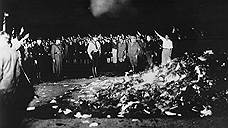
“Property obliges and binds tightly”
In 1938, Magda Goebbels was ready to file for divorce because of her husband's love affair with the Czech actress Lida Baarova. And Joseph Goebbels himself at that time seriously thought about resignation. Adolf Hitler personally dealt with the brewing scandal: he imposed his veto on the divorce, sending the Minister of Propaganda to Rhodes for several months
"One people, one country, one leader!"
With the outbreak of World War II in 1939, Joseph Goebbels stepped up propaganda with special radio news bulletins and extended newsreels. And from May 1940, the weekly Das Reich, founded by Goebbels, began to appear, for which the propaganda minister himself constantly wrote articles designed mainly for the educated population in Germany and abroad.
“Courage is courage inspired by spirituality. The stubbornness with which the Bolsheviks defended themselves in their pillboxes in Sevastopol is akin to some kind of animal instinct, and it would be a deep mistake to consider it the result of Bolshevik convictions or education. The Russians have always been like this and, most likely, will always remain so.
During the war between Nazi Germany and the USSR, Joseph Goebbels repeatedly tried to persuade Hitler to change the political course towards the Slavic peoples, hoping thereby to improve combat conditions for German soldiers in the Soviet Union (the Minister of Propaganda and one of the Fuhrer's closest associates made another attempt after the defeat at Stalingrad) . In his diary, Goebbels wrote: “... the slogan that in the East we are fighting only against Bolshevism, and not against the Russian people, will greatly facilitate our struggle there”
“Do you want total war? Do you want it, if necessary, more total and radical than we can imagine it today? .. Do you trust the Führer today more, stronger, more unshakable than ever? .. And now, people, rise up and let it break out storm!"
In an effort to create "a masterpiece of his oratory," Joseph Goebbels wrote a speech on total war, which he delivered to an audience of thousands on February 18, 1943 (pictured), by which time the Nazi army and its allies were already suffering heavy defeats on the war fronts. This 109-minute speech is considered one of the most famous of Goebbels' career and also one of the most famous public speeches during World War II. It is known that on that day the Minister of Propaganda left the podium having lost seven pounds (approximately 3.5 kg)
“There will be no act of surrender under my signature!”
On April 22, 1945, Joseph Goebbels and his family moved to a bunker under the Reich Chancellery ("Führer Bunker"). On April 30, after Hitler's suicide - in accordance with the political testament of the Fuhrer - the Minister of Propaganda became his successor as Reich Chancellor, but refused to sign the act of unconditional surrender of Nazi Germany. On May 1, 1945, Joseph Goebbels and his wife Magda committed suicide after poisoning their six children with potassium cyanide. The Soviet military found their half-burned corpses the next day, May 2
In the photo: interrogation of Dr. Voss at the corpse of Goebbels, 1945
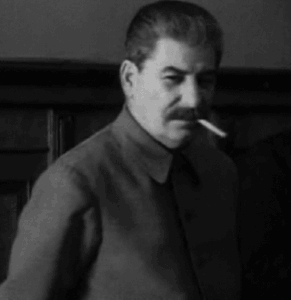
Below are 10 popular quotes about the USSR and the Third Reich. Their "authors" never said this, but in fact the quotes are correct. And those to whom they are attributed often acted in this way in life.
1. "The bigger the lie, the sooner it will be believed"(J.Goebbels).
Goebbels never said this. Hitler wrote this about the role of Jews and Marxists in the defeat of Germany in the First World War (" Mein Kampf", Ch.10): "These gentlemen proceeded from the correct calculation that the more monstrously you lie, the sooner they will believe you." True, although Goebbels never said such a phrase, he acted as Minister of Propaganda exactly in accordance with this motto By the way, there really is one aphorism, the author of which is Goebbels, the phrase has firmly entered the Russian language, but no one guesses who invented it. "Everything ingenious is simple"(J. Goebbels, article "Twenty Tips for a Dictator and Those Who Want to Become One", 1932)
Paul Padua. "The Fuhrer Speaks" (1939).
As Albert Speer said in his last speech at Nuremberg: " With the help of such technical means as radio and loudspeakers, independent thinking was taken away from eighty million people ... "
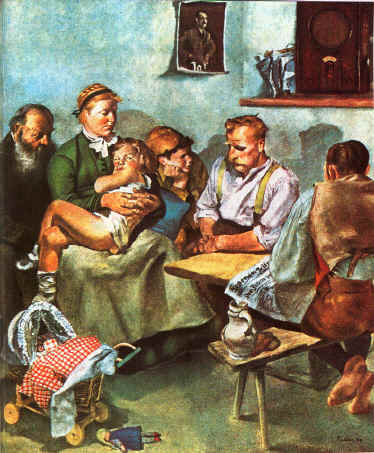
2. "USSR - Upper Volta with missiles"(Helmut Schmidt, Chancellor of the Federal Republic of Germany in 1974-82)
There is no evidence of where or when he said this. The fact that Schmidt is the possible author of this aphorism was first mentioned in a 1993 book written by a group of American Sovietologists. This is given there as an assumption, and with a characteristic caveat: "If Schmidt had come to such a discovery during the Brezhnev era, he could only share it with his wife, late at night and under the covers ...". This is a hint that West Germany in Schmidt's time was in no position to Soviet Union. 500 thousand soldiers, 8000 tanks and how many missiles of all kinds were in the GDR, one might say, under the windows of Schmidt.
Most likely the authors of the aphorism are Western journalists. Perhaps it was first publicly voiced by the Financial Times journalist David Buchan in the article "Soviet export of technology" dated September 14, 1984. Be that as it may, the phrase has become catchy, because accurately reflected the essence of the USSR: military power to the detriment of everything else.
Igor Myasnikov. "Program "Time"(1978).
Picture of 1978. At this time, the USSR produced 200 intercontinental and more than 1000 cruise missiles per year, 10 nuclear submarines, 1500 combat aircraft. In year! There was also a struggle with America for influence in Angola and Nicaragua. What these people in the hut were told about by the Vremya program.
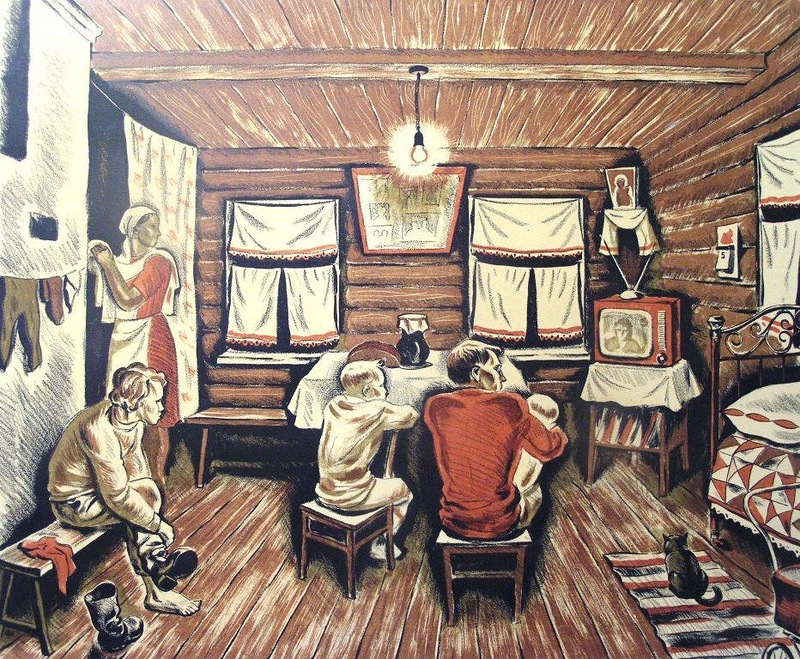
3. "No person - no problem"(I.V. Stalin)
Another version of the same aphorism: "We have no irreplaceable people." Alas, Stalin did not say anything of the sort. Both phrases were invented by Soviet writers. "There is a person - there is a problem, no person - there is no problem" - this is from Anatoly Rybakov's novel "Children of the Arbat" (1987). And "there are no irreplaceable people" - from the play by Alexander Korneichuk "Front" (1942). Moreover, Korneichuk, a Ukrainian Soviet playwright and 5-time (!) laureate of the Stalin Prize in the field of art, was NOT the author of this aphorism himself either. He only translated into Russian the slogan of the French Revolution of 1789-94. The Commissioner of the Convention, Joseph Le Bon, responded with this phrase to a petition for clemency from an aristocrat.
In 1793, the Viscount de Giselin, arrested for political unreliability, asked to spare his life, since his education and experience could still be useful to the Republic (as he thought). To which the Jacobin commissar replied: "There are no irreplaceable people in the Republic!" It is interesting that two years later, in 1795, other revolutionaries sent Commissar Le Bon himself to the guillotine. Well, there are no irreplaceable people!
Egil Veidemanis. "Butovo. NKVD firing range. 1937-1938."(2003)
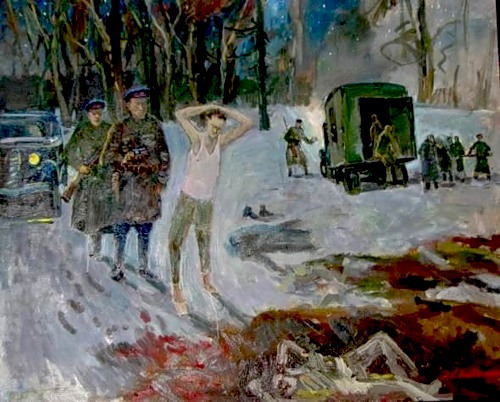
4. "Stalin took Russia with a plow, and left it with an atomic bomb"(Winston Churchill).
Churchill never said that. Although on the basis of the military alliance of 1941-45. really treated Stalin with respect. Even in the Fulton speech on March 5, 1946, which began the "cold war" between the West and the USSR, Churchill said: "I deeply admire and honor the valiant Russian people and my wartime comrade Marshal Stalin." True, this did not prevent Churchill in the same speech from accusing the USSR of planting communism and tyranny in Eastern Europe. By the way, the expression "Iron Curtain" came from the same speech.
As for the phrase about the plow and atomic bomb, its true author is the Stalinist Nina Andreeva from St. Petersburg, the author of the article “I can’t compromise my principles” (the newspaper Sovetskaya Rossiya, March 13, 1988), which was sensational at the time. She cited it as "Churchill's quote". The quote turned out to be false, but its essence corresponds to the facts.
This is most likely a variation on the 1956 entry about Stalin in the Encyclopædia Britannica, written by the Sovietologist Isaac Deutscher: second industrialized country in the world. This was not the result of purely material progress and organizational work. Such achievements would not have been possible without a comprehensive cultural revolution, during which the entire population went to school and studied very hard."
Vitaly Tikhov. "Stakhanovka plant named after OGPU"(1930s).
Everything was. You can't take a word out of a song. And factories, and Stakhanovka, and the OGPU. By the way, the factory OGPU is now OAO LOMO. Privatized in the 1990s. Working. Now it is owned by three families (one of them is the former minister Klebanov), as well as guys from the former MMM voucher fund. Well, good. Although three families, but came to a bright future.
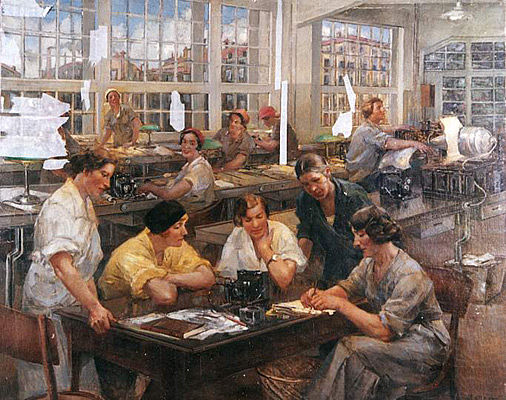
5. "I thought I would die of old age. But when Russia, which fed all of Europe with bread, began to buy grain, I realized that I would die of laughter" (Winston Churchill).
For the first time, the USSR began to buy grain in the West on a large scale (more than 1 million tons) - in 1963. The scale grew and in 1984 reached 46 million tons. Churchill died in 1965, having lived to be 90 years old. Indeed, in his lifetime, he found Russia the world's largest grain exporter (1900-1913), and found the beginning of the reverse process - as the USSR began to turn into the world's largest grain importer. There is only one problem: Churchill did NOT say this.
Vasily Borisenkov. "In Cabbage Fields"(1958).
People in urban clothes gather cabbage in the fields. In the USSR was not known in Western countries the custom to drive the townspeople in the fall to pick vegetables in the village. Students were forcibly involved in agricultural work (for 1-2 months, the price of the issue is deduction), for a day or two they could take out schoolchildren, employees of city enterprises, etc. And yet, throughout the history of the USSR, there were queues for groceries in stores.
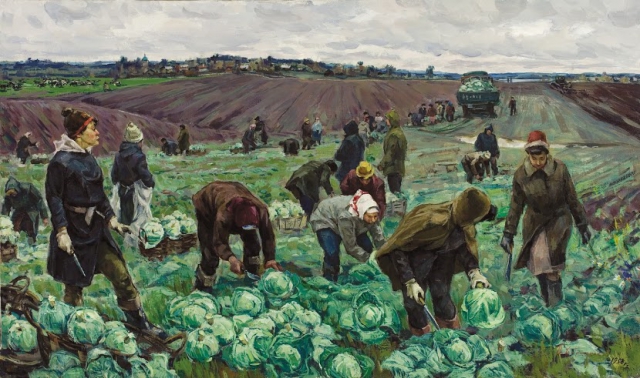
Alexey Sundukov. "Turn"(1986)
Queues were generally a trademark of the USSR. A sad and painful sight... The disappearance of grocery lines in Russia after 1991 is the greatest geopolitical catastrophe of the 20th century.
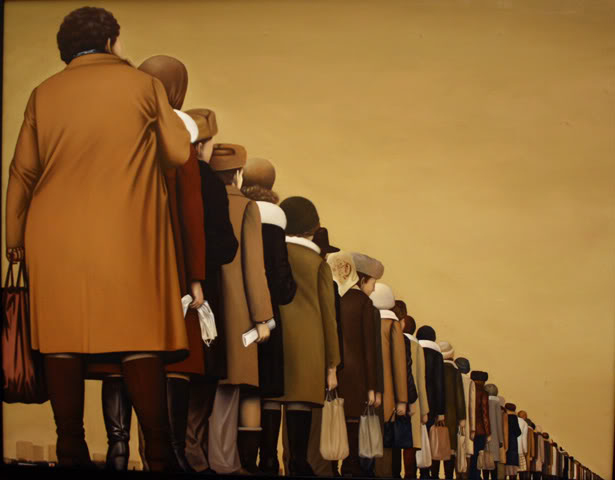
6. "Don't feel sorry for the soldiers, the women still give birth!"(Marshal Zhukov).
Zhukov did not say this. Here again is the case when the "author" of the quote did not utter such words, but actually acted in this way. The true author of "Women are still giving birth" is not known. According to one version, it was Field Marshal Apraksin during the battle with the Germans at Gross-Jegersdorf (1757, the Seven Years' War). The general refused to send cavalry to attack, allegedly saying: "The horses are worth gold, but women still give birth to soldiers." According to another version, this was written by the wife of Nicholas II in a letter to the tsar dated August 17, 1916. The tsarina complained to her husband about the Minister of War Bezobrazov, who, in her opinion, mediocrely killed the guards at the front:
"He criminally ruined your guard... This should not go unpunished. Let him suffer, but this example will benefit others.... I regret that I did not talk about this more insistently at the headquarters, and not with Alekseev, yours prestige would be saved ... The generals know that we still have many soldiers in Russia, and therefore do not spare lives , but these were superbly trained troops and all in vain.”
The letter itself does not say anything, except that Tsaritsa Alix interfered in military affairs, up to attempts to give instructions to the Supreme Commander-in-Chief (Nicholas II) and the Chief of Staff of the Headquarters, General Alekseev. As for "the women are still giving birth" - in a letter she just regrets such methods of warfare. The generals know that there are a lot of people in Russia, therefore they do not spare the soldiers and destroy in vain ... It is likely, given subsequent revolutions, that the words of the empress were changed for propaganda purposes, the meaning was changed to the opposite (instead of condemnation - approval), well, the phrase went to the people.
Denis Bazuev. "Stop!"(2004)
A series of paintings "Battle for Leningrad" by a contemporary artist. D. Bazueva. In 1941-42. Soviet troops near Leningrad were constantly attacking, trying to break the blockade. Some German machine gunners, they say, went crazy ...
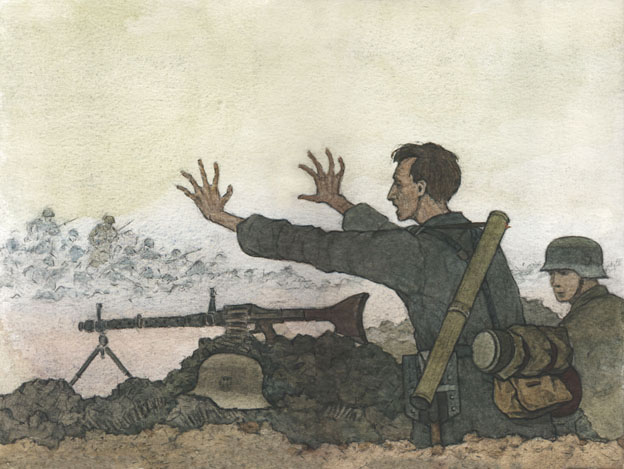
7. "The Franco-Prussian War was won by a German schoolteacher"(Otto von Bismarck).
A popular phrase with an allusion that a nation that is superior to the enemy in education and common culture, more effectively wage war. However, Chancellor Bismarck did not say that. This was said by a professor of geography from Leipzig, Oskar Peschel, and not about the Franco-Prussian war (1870-71), but about the Austro-Prussian war (1866), in which the Germans also won. In July 1866 Oskar Peschel wrote in one of the newspaper articles: "... public education plays a decisive role in the war ... When the Prussians beat the Austrians, it was the victory of the Prussian teacher over the Austrian school teacher". This attention to study was preserved among the Germans later. A Russian officer in tsarist Russia studied at a military school for 2 years, as much as the Germans - sergeant major.
Emil Scheibe. "Hitler at the front"(1943).
This is how the Germans painted themselves. It is somewhat doubtful that someone here could go crazy from the number of machine gun shots ...
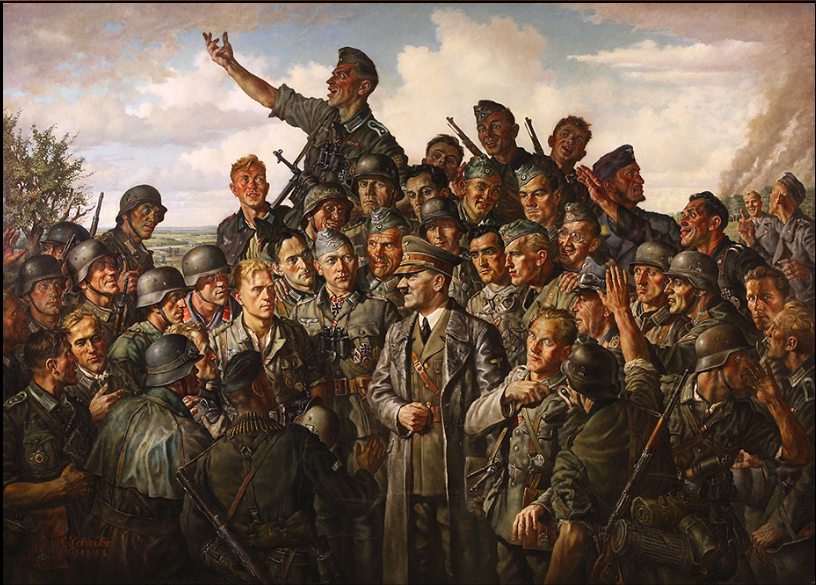
8. "When I hear the word "culture" - my hand reaches for a gun"(Hermann Göring).
Sometimes attributed also to Goebbels. But neither of them said that. This is a phrase from the play "Schlageter" by playwright Hans Jost (1933). Hans Jost was a Nazi, winner of the "Grand Prize of the NSDAP" in the field of art and an SS Gruppenführer. After World War I, the victorious Allies briefly occupied the Rhineland, Germany's main industrial region. The country capitulated, the monarchy collapsed, the Kaiser fled, everyone reconciled. But there was one fanatic, Albert Schlageter, a former front-line officer. who continued to fight. He derailed French trains. He was caught and shot in 1923.
Nazi propaganda turned this Rhenish partisan into a hero. In the play by Hans Jost, he discusses with his friend whether it is worth spending time studying (to join the culture) if the country is under occupation. The friend replies that it is better to fight than to learn, and that at the word "culture" he unlatches his Browning. And from this phrase, after a series of creative revisions, Goering's "quote" was obtained.
Kukryniksy. "End"(1947-48).
These guys are going to need the Browning for another purpose now.
![]()
9. "Russia is a prison of peoples"(V.I. Lenin).
In the USSR, this phrase was often used in propaganda to compare Tsarist and Soviet Russia. There is an empire where non-Russian nationalities were oppressed, here - a voluntary union and friendship of peoples. Lenin did use this aphorism in his works, but he was not its author. But who the author was was not advertised in the USSR. For bad thoughts could inspire.
Author - Marquis de Custine, book "Russia in 1839" describing Nicholas Russia (the time of Nicholas I) with the deadly characteristics of the Russian political system and the Russian people as a whole. In short: Russia is not Europe, a state of general lack of rights and "pyramidal violence." That is, the chiefs spread rot on the people, the chiefs have higher chiefs, and at the top - the king, who had everyone in mind, since his power is one-man and irremovable. The rich here are not fellow citizens of the poor... The bureaucracy is monstrous ("a land of useless formalities"). "The police, so nimble when it comes to torturing people, are in no hurry when they turn to them for help..." And so on. Tsapki, evsyuki and Serdyuki, and the universal Sveta from Ivanovo. Here is such a picture, by the Marquis de Custine.
The Marquis's book about his trip to Russia in 1839 was a huge success in Europe. Almost the same as the previously published book by another Frenchman - Alexis de Tocqueville about his trip to the USA ("Democracy in America", 1835). Only de Custine came and spat, and Tocqueville, on the contrary, sang the defirambs of the USA: the Anglo-Americans as a nation were originally born in freedom, equality, whence their successes and a great future, etc. Zbigniew Brzezinski once said that to understand Russian-American relations, it is enough to read only 2 books: de Custine on Russia and de Tocqueville on the USA.
Wojciech Kossak. "Circassians in Krakow Suburb"(1912).
This is the uprising of 1863 for an independent Poland. Suppressed by Russian troops. In the role of Russians (judging by the picture of the Polish artist) some persons of Caucasian nationality acted. A wild horde of Circassians in hats and with an Orthodox cross on the flag rushes through the city crushing people European look. Interestingly, at the same time, Polish recruits were called upon by Russia to participate in Caucasian war. One barrack of the prison of nations pacified the other and vice versa. Well, as you wish. There is no other way to build an empire from Warsaw to Alaska.
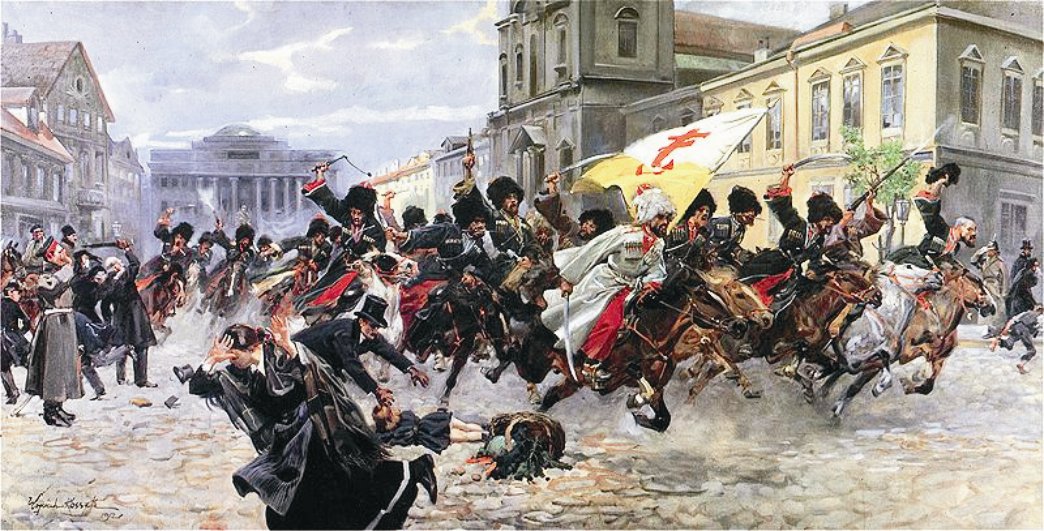
10. "Who are these gentlemen Nazis? - Murderers and pederasts"(Benito Mussolini).
I also thought it was Mussolini. In 1934, in Austria, local Nazis killed Chancellor Dollfuss (an opponent of the Anschluss), with whom the Duce had a good relationship. Well, Mussolini threw this phrase in his hearts. In fact, it was said in an editorial in the newspaper "Il Popolo di Roma" ("People of Rome"), which was the mouthpiece of the Fascist Party in Italy. It strongly condemned the assassination of the chancellor and said that the criminals were connected "with murderers and pederasts in Berlin."
It was an allusion to Ernst Röhm, the leader of the Nazi storm troopers, who was a homosexual (and many people from his entourage too). It was the sharpest attack by the Italian fascists against their German counterparts in the entire history of their relationship. Mussolini, himself a former journalist, controlled the politics of "Il Popolo di Roma", and of course, an editorial about "murderers and pederasts" from Berlin could not have come out without his knowledge. However, there is no evidence that he personally wrote this article.
On the picture: Gay Pride in London June 27, 2013 During the "Night of the Long Knives" in 1934, Hitler eliminated Rem and his gay storm troopers, later all homosexuals in the Reich began to be put in concentration camps. But here's the paradox: the SS uniform that Hugo Boss once sewed still inspires and excites gays all over the world.
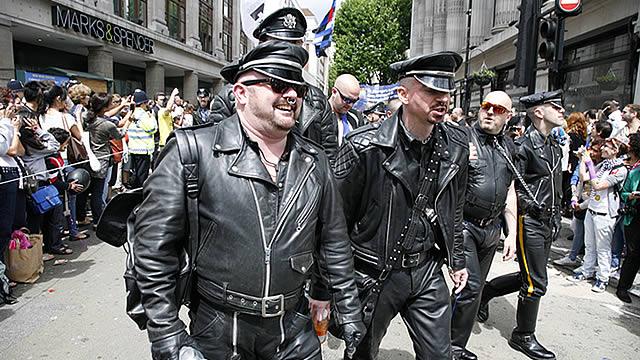
Tom of Finland (Touko Laaksonen). gay comics(1962)
This is the world's most famous author of gay graphics. Finnish artist who gained recognition in America in the 1960s. In 1941-44. fought in the Finnish army against the USSR. At that time in Finland were quartered German troops. As the artist himself admitted, he had sexual relations with the Germans and the German form wildly aroused him. No, I do not want to say that the artist Tom of Finland- this is the personification of the behavior of Finland in the Second World War. No, he just liked the shape.

Many years separate us from the events of 1945, when fascism as an ideological doctrine that won in individual states was destroyed. However, the voices of its ideological inspirers still do not stop. Among them are quotes from which can still be found in books, and in films, and on the Internet.
So what was this German orator, a master of propaganda and lies, talking about? Let's try to briefly answer this question.
Who is Goebbels?
The name and surname of this politician do not inspire fear in modern young people, but meanwhile, just a few decades ago, the surname of this leader of the German people was a household name.
He was a very famous figure in Nazi Germany, an associate of Hitler, who was in charge of propaganda and public education in the Reich. A brilliant orator, Goebbels could talk for hours. Millions of people listened to him, millions of people believed his words. However, the propagandist himself, in his letters and conversations with loved ones, often allowed himself such words about the Fuhrer or the party that ordinary citizens of the country could not allow.
Goebbels was known, of course, as an intelligent, erudite and talented person, however, being a convinced Nazi, he caused a huge amount of misfortune to many peoples on earth, including his own German. The crimes of this man are truly terrible. However, he did not survive the Reich, and his death in 1945 was shameful and terrible.
Joseph Goebbels: quotes that went down in history
Goebbels made many public appearances. Many of his statements have been preserved for us by the film, something was covered in the memoirs of his associates and colleagues, but we will consider only some of the expressions of this person, having previously classified them.
- His quotes about the new Germany.
- About politics.
- About Russians.
So, with regard to quotes about Germany, Goebbels was a consistent supporter of the fascist idea, according to which the future of the country should be determined by a strong state headed by racially pure people.
It will be with the right to interfere with the private life of the common man. For example, Joseph Goebbels noted that the goal of the nationalist revolution is just a totalitarian state.
Goebbels brought a lot of evil to the German people with these words, historians of the whole world are still studying his quotes about the essence of the Nazi state, trying to understand what role this man played in unleashing the world war.
He spoke about the dictatorship of the nationalist idea, which should be the engine of social progress. The politician said that the will of the people should be in accordance with the will of the great leader, while an experienced dictator should be able to keep his people in check.
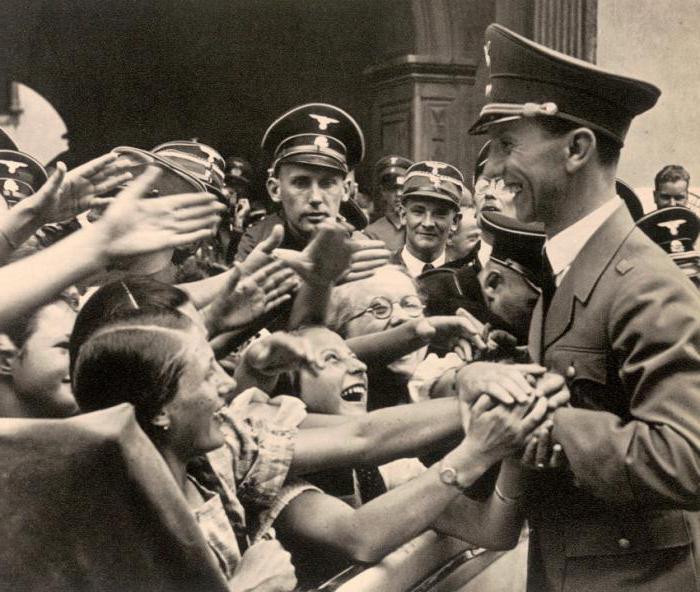
Goebbels on politics
No less widely known are Goebbels' quotes about propaganda, as well as politics.
The great propagandist of the Reich knew how to speak beautifully. For example, he compared the moderate politician Ribbentrop to a champagne merchant who seeks personal gain rather than thinking about the political success of his country.
By the way, Goebbels subordinated all forms of human activity to politics, and generally called jurisprudence the “corrupt girl” of all politicians.
Goebbels wrote a lot about lies, a quote about political and historical lies is widely known. So, he noted that it is possible to reformat the consciousness of the people only by replacing its true history with a false one.
Joseph Goebbels about Russian people
In 1941, she faced an unsolvable task for herself: resistance to the invasion of the German army in the USSR was very strong. Naturally, the master of propaganda of the Reich had to turn his attention to our compatriots. Goebbels' quotes about Russians are also widely known today.
For example, this skillful orator called the Russian people "subhuman", animals that do not represent any historical value. “This is not a people, but a rabble,” wrote the German politician.
There are many quotes on this topic, but in general they have one motive: the Russians must be destroyed, and their lands taken away for the hardworking German people. So, in general, everything that Goebbels said about Russians (quotes that were passed from mouth to mouth) is purely negative.
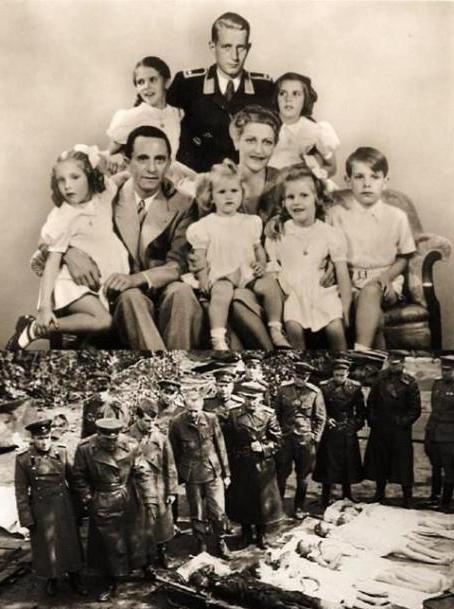
However, the Russians still won. Therefore, Goebbels in 1945 found his inglorious end.
- In contact with 0
- Google+ 0
- OK 0
- Facebook 0

